The Enduring Beauty of “Persepolis”
This powerful story shines with poetic animation, an exploration of deeper truths, and the protagonist's complex search for identity.
In ten years of run time, Shameless (U.S.) always stuck to its guns (and baseball bats) about character diversity.
A show chock full of penny-pinching and dark humor, Shameless is known for its depiction of the jarring realities of life in poverty for the Gallaghers, a predominantly white family living on the South Side of Chicago.
Despite the Gallaghers facing life or death just to keep their lights on, Shameless’ dark themes are thinly veiled with witty and quick-paced dialogue that makes it easy to skim over tragedy and focus on the outlandish comedy in the script. Bright lighting, bustling dialogue, and the constant chaos that erupts from the Gallagher household distract from the core elements of a rattling reality that many gentrified communities actually face across America. Director Paul Abbott trades pity for humor as shock value — a great technique if you’re trying to gain the appeal of an audience who has never been in the Gallaghers’ shoes.
On the brink of losing their home at least once a season and without the guidance of either parent, the Gallaghers’ reality of lying, cheating, punching, and stealing their way through the South Side are very relatable to too many Americans. What keeps this show’s audience so vast, though, is its ability to appeal to all class demographics. The drama in this show can seem outrageous to those who haven’t experienced it, but the Gallaghers aren’t looking for pity. The comedy Abbott draws out of every line of Shameless’ script brings the drama just close enough to home for the underprivileged, and just on the brink of insanity for the privileged.
Seven out of its nine main characters are white, but Shameless is still not shy about its diverse casting. The show features six wayward siblings navigating very adult problems alone. Fiona (Emily Rossum), the eldest daughter of Frank Gallagher (William H. Macy), rather blindly leads her siblings through elementary school up into high school. Lip, (Jeremy Allen White), Ian (Cameron Monaghan), and Debbie (Emmy Kenney) all raise hell just to scrounge up some cash for the electric bill, or to cheat their way through finals, while Carl (Ethan Cutcosky) and Liam (Brendan Sims/Christian Isaiah) usually find ways to stir up trouble in their backyard.
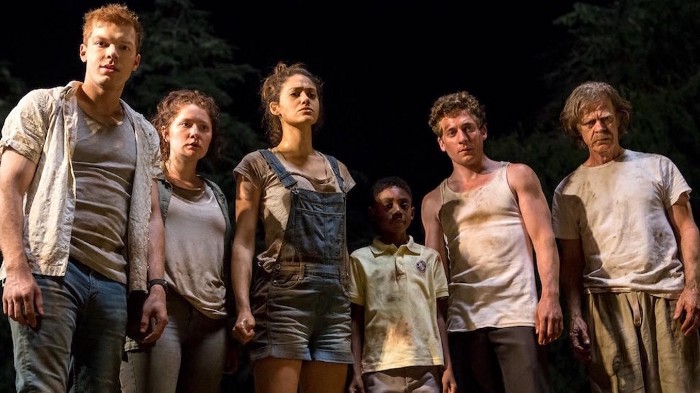
Liam, the youngest of the Gallaghers, is rather hastily explained to be born of two white parents despite being Black. The Gallaghers’ nearby neighbors Kev (Steve Howey) and V (Shanola Hampton) are second parents to the crew, and Liam may not have very many Black role models, but at least he has V, a Black, bisexual business owner and mother of two children.
Among the other Gallaghers, the diversity stretches further, with Debbie and Ian both being on the queer spectrum.
My only qualm with Shameless after revisiting it sometime later, is what damage does such scandalous comedy and drama do to the image and stereotypes of the characters that they are portraying? Some meaningful characters to inclusivity that stand out seem promising, but upon further inspection, all have questionable motives in plot development. Does the sacrifice for proper, expansive, diversity have to be a dark comedy and white-centric drama that makes minorities the butt of the joke and torment? I’m not sure that it does, but I’m also not sure that that’s what Shameless has watered its characters down to.
“Nobody’s saying our neighborhood is the Garden of Eden. H*ll, some people say God avoids this place altogether”.
The first choppy introduction of the Gallaghers — the family at the center of Shameless’ plot — is given by Frank, the most dislikeable main character of all time, and also the patriarch of the Gallagher household. Frank’s words mirror quite well how I feel about the representation of people of color and minority groups on Shameless.
It is not my place to reflect on the Black experience in Shameless. I can only discuss the shortcomings that white characters have in worsening the effects of racism on television, and Liam is one vast example. He is constantly exploited by his family, whether by Frank’s get-rich scheme to sell his “single father” pity story on the streets for some extra cash, or even by the eldest Fiona’s plot to send the youngest daughter Debbie to school with Liam for show-and-tell. His family’s ignorance of his identity is glimpsed over, and while it is so shockingly awful and blatantly disrespectful, the characters give little acknowledgment to his mistreatment, although that’s how the Gallaghers deal with everything shocking and awful.
Liam’s representation is a slippery slope. In the earlier seasons, he toed the line of being plopped at the Gallagher dining table for Shameless to earn some diversity points. Later, though, as Liam matures, his character is given agency over the way that Frank treats him, and there is even a segment in season 7 where the show touches on Liam’s private school not letting him back in after reaching their diversity publicity quota for the school year. Real touchy subjects that Black boys living in poverty like Liam have had some light shed on recently. The problem is, were they to highlight the growth and challenges Liam himself has to live with, or were they put in place to highlight the shortcomings of other characters or even the misfortune of others?
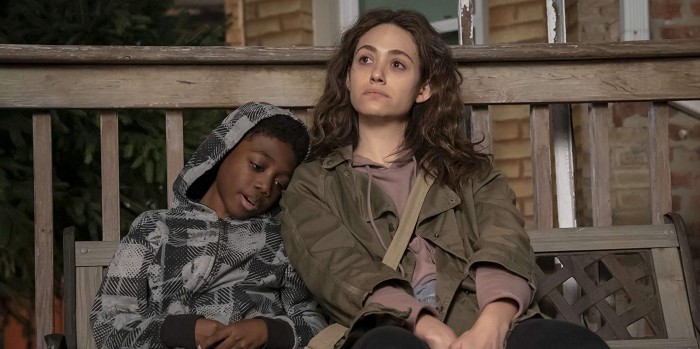
In season 4, Liam’s older sister, Fiona, exposed him to cocaine accidentally, causing the child to be hospitalized and taken away due to her neglect. The show then followed Fiona’s story for the rest of the season regarding her struggles of losing her siblings to the system. It hardly touched on Liam’s perspective in the foster care system other than for comedic effect or to give sympathy to Fiona. It’s hard to say if these portrayals of Liam’s life in the care of Fiona and Frank were meant to be damaging. Aspects of Liam’s life are very much real to too many Black boys, and maybe simply representing these struggles overshadows the harm that it does for the sake of comedy.
Unfortunately, Liam isn’t the only Black character exploited for white gain in Shameless. In season 9, Debbie Gallagher explores a relationship with queer Black electrician Alex (Ashley Romans), who feels played by Debbie shortly after she realizes that Debbie isn’t gay and still exploring her sexuality. The two revive their relationship once Debbie comes to terms with her sexuality and begins to actively seek out Alex. Debbie could have explored her sexuality on her own without the expense of Alex’s feelings, but that wouldn’t have done much for drama. This could be written off as just a complicated mix of emotions for a young teen girl who doesn’t know what she wants yet — a valid, common experience among young girls exploring their sexualities.
The story Shameless told of Alex and Debbie’s time together does reflect that of many young girls, so does this really do any harm? The girls did communicate with each other, and Debbie was honest with Alex about her feelings. Many aspects of their relationship were just a product of their circumstances. The problem here is that Alex didn’t have her own storyline at all, and upon Debbie realizing her sexuality, Alex didn’t play much of a role in the show. At a time when Black girls already get such little screen time, especially those portraying queer characters, maybe it’s not such a good idea to only feature Black girls in this context when it’s to highlight the evolution of a white main character.
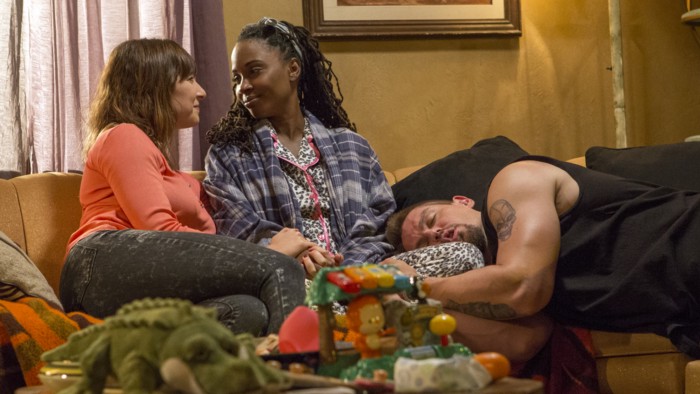
On the topic of bisexuality, which is regularly explored on Shameless, the writers do an excellent job exploring the fluidity of sexuality, especially involving women. Monica Gallagher (Chloe Webb), Debbie, Svetlana (Isadora Goreshter), V, and a few other minor characters all at one point had relationships with other women. Bisexuality in mass media is often portrayed to be a youthful experience between women who are just starting to figure out where they stand with their sexuality. Shameless, instead, features queer women of all ages and races in ways that push back against toxic stereotypes. Lesbians aren’t old, lonely white women who aren’t wanted by men in Shameless. They’re young apartment owners in stable relationships and girls in the workforce disguising themselves as men for equal pay (See: Alex and Nessa).
One issue I have with the portrayal of queer women in this show has to do with a couple of separate cases that made bisexuality into a revenge tactic for ex-lovers. Monica came back into Frank’s life with Roberta in tow to rub her in his face half of the time, as did Lip Gallagher’s college love, Amanda (Nichole Bloom). Kev and V’s natural progression into a relationship with Svetlana seemed more natural than the relationship between Monica and Bob. Bisexuality in media can be harmful if it features bisexual women only when their past relationships with men didn’t work out. This is a damaging stereotype that makes it seem like a woman dating other women is a last resort only to be exhausted when the man she’s been pining after isn’t interested anymore.
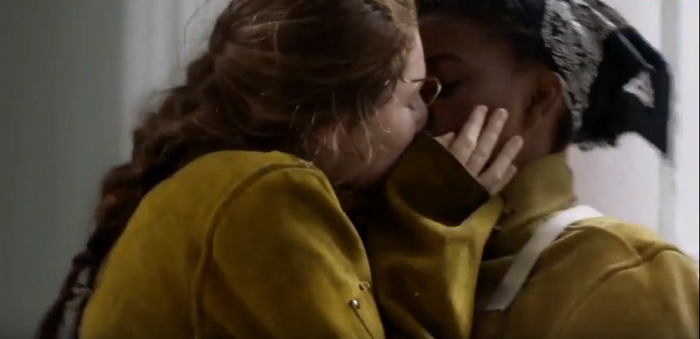
Ian Gallagher, one half of Shameless’ gay duo, verbally expresses his biphobia towards an ex-boyfriend of his, and for what? It was a short-lived, lazy plot point that was designed to end his relationship with the guy in question. Because of the constant misgendering, racist and sexist remarks, and crass nature erupting from all of the Gallaghers, perhaps this narrative was meant to show Ian’s lack of education on the topic. Except… there was no reconciliation for his outspokenness on the subject, no character arc that taught him to do better. His actions had zero repercussions. Later on, in the show’s progression, Ian has another tricky situation with Trevor (Elliot Fletcher), a new lover who is a FTM (female to male) transgender character that is constantly being berated by a clueless Ian, who doesn’t do nearly enough research before coming to Trevor with awfully offensive questions. Elliot Fletcher, a trans man himself, cast to play a trans character (an awesome win for representation!) had to listen to Monaghan’s character feed him a few too many microaggressions for me to be comfortable with.
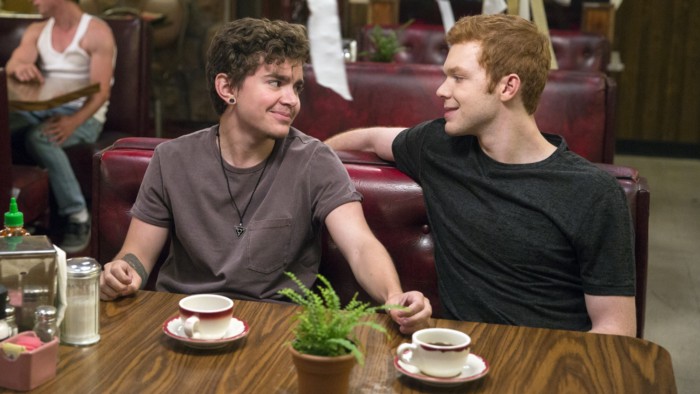
For every awesome glimpse at queer visibility we got, there were equally as many homophobic jabs, and in some cases hooks and uppercuts, too. Ian and his long-term on-again, off-again boyfriend Mickey Milkovich (Noel Fisher) are known to start swinging punches in every argument between each other. They’re constantly dodging Mickey’s dad, who has shot at them and beaten them to a pulp in The Alibi. Again, there are no repercussions for these actions, nothing that helps them learn from their mistakes. It would be one thing if Shameless was trying to show us the realities of homophobia and then dismantling those beliefs after every blow, but it really is just brushed under the rug and saved for the next time Mickey decides to take a swing at Ian. It’s starting to feel like the only creative portrayal of a queer couple that the television industry can provide is the couples that beat the crap out of each other for the sake of drama. It’s really, really getting old. It also doesn’t help that Fisher and Monaghan are straight, cisgender men cast in roles that were suitable for queer actors to play.
Shameless touches on really intense topics like mental illness, PTSD, children with disabilities, adoption, abortion, teen pregnancy, religion, drug abuse, and AA programs. It is as diverse a show as I’ve ever seen. The first season features a closeted Muslim man at war with his sexuality and his wife’s approval. Several seasons talk about the prison system, drug dealing, sex work, single parenting, and lack of health care. It expertly details the experiences of Americans living in poverty, however unimaginable they can seem sometimes.
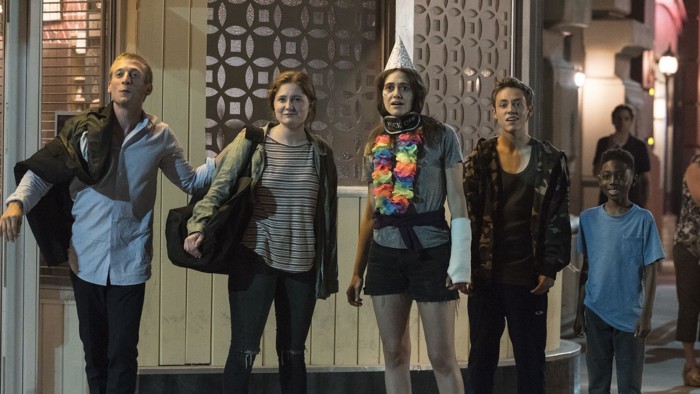
In some ways, Shameless is vibrantly diverse. Very little representation is perfect, though, and Shameless could use a lot of work. It’s a good time to start thinking critically about the way the media is portraying minority groups so that we can start to challenge these perspectives.
For some, it is enough just to see someone just like them on television for the first time. But isn’t that a low bar? Shouldn’t we be doing more to make their characters seem just as well-rounded as white people that so often drown them out in the cast?
-Nathanael Molnár
Related lists created by the same author
This powerful story shines with poetic animation, an exploration of deeper truths, and the protagonist's complex search for identity.